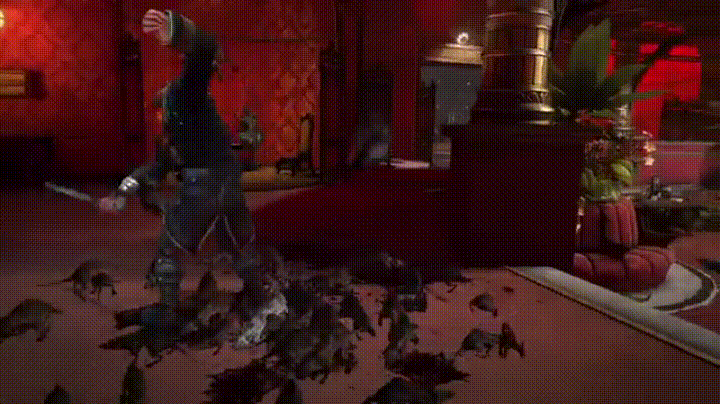|
Enjoy posted:Taking away a character's power is usually the start of their story arc, right (eg Planescape Torment) Agreed, it would be a good hook to start a level 1 character but not in the middle of your campaign.
|
|
|
|

|
| # ? May 31, 2024 12:39 |
|
The Warlock player still has their stats and magic items. They can do and use other things while they figure out/or bring the group on an adventure to figure out a solution Letting them twiddle their thumbs is bad DMing if this is a story your group wants to explore. You might not find it fun but I know and have played with players who would. Everything is table by table. I'm not saying make it the rest of the campaign, but a session or so where they are stuck using a magic staff for spells or find use in Wands and the like for a session or two. Dexo fucked around with this message at 14:42 on Jun 4, 2021 |
|
|
|
Enjoy posted:Taking away a character's power is usually the start of their story arc, right (eg Planescape Torment) This was the last campaign I ran. I had everyone make level 15 characters than in the first session there was a magical conflagration and their bodies were swapped with a group of level 1 adventurers (I had them make level 1 characters ahead of time but didn't tell them why). The campaign was all about trying to recover their old bodies from the level 1 shitheads, who are now rampaging across the world with new found power.
|
|
|
|
Rutibex posted:This was the last campaign I ran. I had everyone make level 15 characters than in the first session there was a magical conflagration and their bodies were swapped with a group of level 1 adventurers (I had them make level 1 characters ahead of time but didn't tell them why). The campaign was all about trying to recover their old bodies from the level 1 shitheads, who are now rampaging across the world with new found power. Ohhh that's great.
|
|
|
|
Dexo posted:The Warlock player still has their stats and magic items. They can do and use other things while they figure out/or bring the group on an adventure to figure out a solution Like I said, you CAN do that and it might work well but it requires extra work and maybe you should just not. If everyone's on board, sure, but it's a delicate balance and most people should just consider it off the table. Take your player aside and say "hey I think it'd be cool if Xargfclbthx yoinked your spells" and if they're like hell yeah that sounds awesome then sure, but the charm of making flat rear end skill rolls to do things wears thin quick.
|
|
|
|
I just think it's pretty oddly restrictive of the stories that can be told, to say because it's might be hard maybe you just shouldn't do this. If it's something that doesn't work and the players stop enjoying it, then kill the plan immediately and instantly just intervene to give them their powerset back. This poo poo is all relatively easy and fluid to deal with at a table that's not a shitshow where people communicate. Dexo fucked around with this message at 14:59 on Jun 4, 2021 |
|
|
|
Should you ever tell a story of a character losing their spells is a pretty different topic from should spell loss be an intrinsic danger of certain classes. Like any story can work if everybody wants to tell it and there's probably a lot of words we can spill on the topic. Should patrons or gods yoink spells on the DM's say so I think we universally came round to "hell no", itt? Right?
|
|
|
|
Mendrian posted:Should patrons or gods yoink spells on the DM's say so I think we universally came round to "hell no", itt? Right? Obviously not. At least without clearing it with the affected player.
|
|
|
|
Mendrian posted:Should you ever tell a story of a character losing their spells is a pretty different topic from should spell loss be an intrinsic danger of certain classes. and there it is. codifying rules for class feature loss in response to a stimulus is basically telling the DM to do this. being depowered is a great story beat, simply look at the greatest action rpg of all time -- kingdom hearts for proof of this concept. it works well and makes for satisfying comebacks. but your players have to be willing to go along with it or you are just depriving players of the small bit of agency they have.
|
|
|
|
Dexo posted:I just think it's pretty oddly restrictive of the stories that can be told, to say because it's might be hard maybe you just shouldn't do this. If it's something that doesn't work and the players stop enjoying it, then kill the plan immediately and instantly just intervene to give them their powerset back. Should you ever tell such stories? Why not. Should it be something the system points you at rather than something the system warns you not to do? No. However warnings can be ignored.
|
|
|
|
Just get a DM that doesn’t suck and players who don’t suck and it works fine
|
|
|
|
please knock Mom! posted:Just get a DM that doesn’t suck and players who don’t suck and it works fine I mean yes but that's also the worst advice. The mythical "good DM" line is pure poison because it puts the idea out there that if your DM can't just Do Everything then they're bad and actually maybe it's okay to not put this expectation out there that you have to be able to handle just rewriting the rules to work and/or bend the plot to satisfy the needs of 5 different people including yourself to be a DM that doesn't suck.
|
|
|
|
If your game has rules quirks that can be obviated by a good DM knowing when to ignore them then it's a sign that your game's rules are poorly written
|
|
|
|
Any DM, no matter how well-intentioned, who takes away a character's power without running it past the player first is in the wrong. That's something you should never, ever do. A DM and a player collaborating on a story where the player's character loses their powers and has to go on a quest to recover them, where the DM and the player plan out how the player will operate to ensure that the player is still having a good time at the table, is absolutely fine and frankly sounds kinda fun. That said, as a DM I would be reluctant to even pitch that idea to most of my players as it would take a very specific kind of player to both enjoy that experience and who could bring the RP side of things enough to make the story work.
|
|
|
|
|
The go-to examples of "it is cool and good to take a PC's divine powers away" seem to often come from "the player says they're playing a good holy man and wants to do cartoonishly evil stuff anyway so obviously need IC punishment for this", which makes narrative sense but also is basically useless in a GMing sense. This is because if someone in my gaming group was acting like an edgelord and doing heinous poo poo like burning orphans or whatever for the laughs I wouldn't go through the stage of in-character punishment for "not following the rules of a fictional religion" but would go straight to the out-of-character step of asking what the hell their major malfunction was and suggesting they find a different group if they want to behave like an idiot. And at the end of the day regardless of what the IC justification was I'd have the same OOC chat of "dude stop being disruptive" with a player doing that regardless of whether their character was a Cleric or not. Otherwise I feel "it would be cool if my character lost their powers for a bit" or "I want to have an arc where my faith is tested" falls alongside "I want to play a reluctant hero who isn't cut out for this" and other similar arcs of "this works fine in a medium that isn't D&D but needs the player and GM to be very on the ball and working together if you want to do it in an RPG."
|
|
|
|
Froghammer posted:If your game has rules quirks that can be obviated by a good DM knowing when to ignore them then it's a sign that your game's rules are poorly written Huh, there is no rules quirk. Taking away a players power just straight isn't in the game RAW. 5e is poorly written, but this ain't an example of it. It specifically does not allow for it. And would instead be "homebrew" or "houserule" content. I don't think I did but if I did say it, I don't mean a mythical "good dm" I just mean a dm and players that can at like communicate goals and intents like adults. I'm a poo poo DM for example but I like to at least think I could go to or my players would come to me if there was an issue.
|
|
|
|
I'd feel justified as a DM taking away a clerics powers if I warned them before they did something heinous against their god but they did it anyway. I wouldn't cut the powers spontaneously though. I've also never had seriously adversarial players, definitely none who would reject a god without being ready to face a consequence. And after that, if they wanted a new god, I'd work that into the story. So, the only player who would be depowered would be making an informed decision, and would have options afterward. Mr. Lobe fucked around with this message at 17:00 on Jun 4, 2021 |
|
|
|
Dexo posted:Huh, there is no rules quirk. Those rules did exist in earlier editions, and I think by just inertia it feels like its still part of the game. Like the discussion we had earlier about kingdom building and mass combat rules. 5e doesn't have that stuff, but it still feels like "part of D&D"
|
|
|
|
Bob Smith posted:The go-to examples of "it is cool and good to take a PC's divine powers away" seem to often come from "the player says they're playing a good holy man and wants to do cartoonishly evil stuff anyway so obviously need IC punishment for this", which makes narrative sense but also is basically useless in a GMing sense. Yeah I'm talking less being an edgelord, and that's honestly something I didn't even consider as a part of what I'm talking about as yeah, I would just tell the player to chill/get the gently caress out. I've only ever thought of it as a player forced to use items, and other things they have accumulated over time to go through an experience where they find a new thing to believe in or power source over the course of a session or so.
|
|
|
|
Rutibex posted:Those rules did exist in earlier editions, and I think by just inertia it feels like its still part of the game. Like the discussion we had earlier about kingdom building and mass combat rules. 5e doesn't have that stuff, but it still feels like "part of D&D" I'm well aware. But I was specifically responding to that post.
|
|
|
|
Rutibex posted:Those rules did exist in earlier editions, and I think by just inertia it feels like its still part of the game. Like the discussion we had earlier about kingdom building and mass combat rules. 5e doesn't have that stuff, but it still feels like "part of D&D" This is just dumb as hell. Rules aren't secretly still in the game because of inertia, if anything your adherence to them belies a lack of forward movement. And honestly the fall thing is so played out. It's almost like there's a "My player is an rear end in a top hat and I will do anything to avoid addressing it" flowchart and the second box on it is "Are they a paladin or warlock."
|
|
|
|
theironjef posted:This is just dumb as hell. Rules aren't secretly still in the game because of inertia, if anything your adherence to them belies a lack of forward movement. The rules might not be in the games, but you still might encounter them. Lots of people play 5e because they simply have to in order to find players, not because they love the new rules. Someone who has been DMing since the days of 1e will likely treat their paladins and clerics like the old days just out of habit. Especially if they have a homebrew setting where thats how things always worked.
|
|
|
|
I have a player who wanted a small dip into warlock for her rogue so we agreed that her patron would be kind of a small-time spirit to justify her never really taking more than one or two levels. So he's also a little more hands on and over the course of ten levels has become sort of a coach for her as well as a source for some little side quests, little knowledge check bonuses for stuff he would know about, things like that. Anyway recently her character was having some memory issues and made a deal with her patron to have him take a deep dive into her mind and try to recover some information. I had the trade-off be that he'd be "gone" while he did that, by which I intended that he wouldn't be in her head for a bit. But the player insisted that it would make more sense and feel like more of a big deal if she also lost access to her warlock spells during this time, which I was surprised by but fine with. I think taking away a character's powers is fine with player buy-in but I'm only really super comfortable with it when it's player initiated.
|
|
|
|
Rutibex posted:The rules might not be in the games, but you still might encounter them. Lots of people play 5e because they simply have to in order to find players, not because they love the new rules. Someone who has been DMing since the days of 1e will likely treat their paladins and clerics like the old days just out of habit. Especially if they have a homebrew setting where thats how things always worked. I've been DMing since 1e and one of the things I'm glad about is a loss of all the weird disjointed cruft stuck in there by a lunatic working largely off grudges.
|
|
|
|
I think the problem with codifying falling/losing your power runs into the same issue that can crop up if not careful with character death/maiming/mind control/being captured and similar; the DM has many ways to affect the game, the player has one, their PC. If they lose their capabilities on that PC or lose the PC altogether, their effective way to play the game is reduced or outright gone. If you’re just a spectator or might as well be one, why would you want to be at that game? Now all of these can be done right with a good DM and player cooperation, but the problem with fall mechanics is they implicitly encourage the DM to hit that “de-protagonize the character” switch (in the earliest version of paladins that seemed to be the major rules limitation on the class, the DM could yank it at any time), and for entirely too many DMs the reason to hit that switch boils down to “player didn’t play the character according to (what I think) their ethics are” or “didn’t cooperate with my railroad plot”. Giving a blessing to potentially permanently ruin a PC out of some stupid idea about “class balance” is bad, the fact it de facto gives the DM control over what a player’s PC does or even believes under pain of destruction makes it turn outright ugly. 4th edition straight up saying “no, you can’t do that, patrons have to deal with bad servants by using their loyal ones” was one of the best ideas the game had, especially since it opens up the idea of heretical/traitor divine and warlock NPCs without the players asking “Well, why don’t THEY fall?”.
MadDogMike fucked around with this message at 20:05 on Jun 6, 2021 |
|
|
|
The problem with depowering is that in fiction it's part of a character arc where the core content is how the character is going to get their powers back. D&D is a cooperative problem solving game first and a drama engine never, you have to bring your own drama, so losing your character's powers isn't the start of a narrative where your character overcomes their problems and saves the day, it just means you're not engaging in the game with your friends. The GM can write a plot where you have to regain your power, or the party can play along and make their primary quest to help you out, but unless the GM is also building an entire alternative system to produce tension as you achieve that goal, you're still not actually a part of the game during that time, beyond roleplaying feeling bad about it.
|
|
|
|
theironjef posted:This is just dumb as hell. Rules aren't secretly still in the game because of inertia, if anything your adherence to them belies a lack of forward movement. reflex saves and bluff checks still are in the game because i will never in a million years fix myself calling them that
|
|
|
|
Taking away a martial's agency sucks. Tearing up a wizard's spellbook is  . .This is the way of things.
|
|
|
|
Toshimo posted:Taking away a martial's agency sucks. it's true and you should say it
|
|
|
|
Azathoth posted:Any DM, no matter how well-intentioned, who takes away a character's power without running it past the player first is in the wrong. That's something you should never, ever do. Yes, even in AD&D where this poo poo is an explicit feature of some classes, you should have a conversation about what this can or will look like at the table before ever doing it. The player should know under which conditions the character can lose their powers and how specifically that character can work to regain those powers. It should be a narrative choice made by the player. theironjef posted:I've been DMing since 1e and one of the things I'm glad about is a loss of all the weird disjointed cruft stuck in there by a lunatic working largely off grudges. I've been DMing almost as long, and I am very happy that we're no longer pretending entire classes are balanced around the idea of me punishing the PC if they act inappropriately. pog boyfriend posted:reflex saves and bluff checks still are in the game because i will never in a million years fix myself calling them that I am the worst with this stuff. It doesn't help that I'm GMing 3 different systems right now.
|
|
|
|
So if I were to play a Shepard Druid, what's the better bang for the buck with Conjure Animals - opting for swarms of 1/4 CR things or getting the bigger nastier animals? Like, you can get a giant elk or a Polar Bear on one end of the spectrum, or like 8 gigantic vipers or a whole pack of wolves on the other. The comedy option would be for swarms of rats / crows (if the spell / DM permits, I don't know if it explicitly works for swarm animal templates) - it'd be hillarious to break into a bandit den and start the fight off by whistling and having hundreds of fey rats pouring in through every crack in the wall - consuming everything they run into.
|
|
|
|
Thousands and thousands of bees is always the correct answer.
|
|
|
|
|
DeathSandwich posted:So if I were to play a Shepard Druid, what's the better bang for the buck with Conjure Animals - opting for swarms of 1/4 CR things or getting the bigger nastier animals? Like, you can get a giant elk or a Polar Bear on one end of the spectrum, or like 8 gigantic vipers or a whole pack of wolves on the other. The comedy option would be for swarms of rats / crows (if the spell / DM permits, I don't know if it explicitly works for swarm animal templates) - it'd be hillarious to break into a bandit den and start the fight off by whistling and having hundreds of fey rats pouring in through every crack in the wall - consuming everything they run into. 
|
|
|
|
DeathSandwich posted:So if I were to play a Shepard Druid, what's the better bang for the buck with Conjure Animals - opting for swarms of 1/4 CR things or getting the bigger nastier animals? Like, you can get a giant elk or a Polar Bear on one end of the spectrum, or like 8 gigantic vipers or a whole pack of wolves on the other. The comedy option would be for swarms of rats / crows (if the spell / DM permits, I don't know if it explicitly works for swarm animal templates) - it'd be hillarious to break into a bandit den and start the fight off by whistling and having hundreds of fey rats pouring in through every crack in the wall - consuming everything they run into. A Shepard Druid banging your bucks? Ewe are pretty gross dude.
|
|
|
|
Oof, the jokes in this thread are getting worse by the post.
|
|
|
|
DeathSandwich posted:So if I were to play a Shepard Druid, what's the better bang for the buck with Conjure Animals - opting for swarms of 1/4 CR things or getting the bigger nastier animals? Like, you can get a giant elk or a Polar Bear on one end of the spectrum, or like 8 gigantic vipers or a whole pack of wolves on the other. The comedy option would be for swarms of rats / crows (if the spell / DM permits, I don't know if it explicitly works for swarm animal templates) - it'd be hillarious to break into a bandit den and start the fight off by whistling and having hundreds of fey rats pouring in through every crack in the wall - consuming everything they run into. If you're playing a Shepard I don't know why you wouldn't be a Moon Druid after working so hard for so long to get there.
|
|
|
|
Mr. Lobe posted:I wonder what should happen with a druid who goes rogue and starts wrecking up wilderness carelessly while pursuing personal enrichment. You'd think acting contrary to the interests of the natural world would affect their powers. It's a setting question. Do druids get their abilities from being in tune with nature, and acting according to the druidic codes? This leads to stories about supernatural reprisals, or about compromising desires against requirements if someone breaks with the codes. Or is the source of druidic power completely indifferent to behaviour, and the reason the druidic codes endure is because powerful cultural gatekeepers only initiate people into the order who would uphold those beliefs? This would lead to stories about rebellion, or about exploring potential.
|
|
|
|
I just finished a campaign as a level 6 paladin, and I came to the conclusion that the only spells where I could ever justify burning a spell slot over a divine smite were Sleep (only at lower levels) and Protection from Evil and Good during relevant fights. I'm not an obsessive min-maxer when it comes to builds, but I think I'm pretty good at the game, but did I miss something? I still had fun being the party's tank, positioning myself so the other melee characters could enter flanking positions, and reviving downed melee party members with LoH, but I felt like my actual actions were "hold auto-attack" most of the time.
|
|
|
|
Quixzlizx posted:I just finished a campaign as a level 6 paladin, and I came to the conclusion that the only spells where I could ever justify burning a spell slot over a divine smite were Sleep (only at lower levels) and Protection from Evil and Good during relevant fights. Command is very good for getting flying enemies or backline spellcasters to drop everything and get into melee range
|
|
|
|

|
| # ? May 31, 2024 12:39 |
|
Quixzlizx posted:I just finished a campaign as a level 6 paladin, and I came to the conclusion that the only spells where I could ever justify burning a spell slot over a divine smite were Sleep (only at lower levels) and Protection from Evil and Good during relevant fights. Paladin spell slots are for Smiting for the most part. An “optimized” paladin build is generally built to go crit fishing and then burn smites when a crit lands. Positioning gets to be a bit more important at 6/7 when you start working with your aura, but yeah, you’ll never really be using many spell slots on actual spells. It’s just not what they’re for; the idea of having spells provides some flexibility at the cost of your primary source of combat power. But it’s clearly rarely a great trade with other casters around.
|
|
|








































